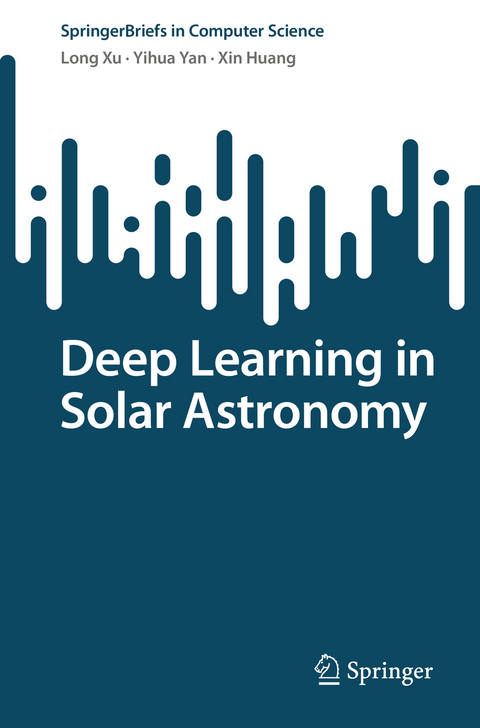
Deep Learning in Solar Astronomy
Springer Verlag, Singapore
978-981-19-2745-4 (ISBN)
Astronomical study starts with imaging from recorded raw data, followed by image processing, such as image reconstruction, inpainting and generation, to enhance imaging quality. We study deep learning for solar image processing. First, image deconvolution is investigated for synthesis aperture imaging. Second, image inpainting is explored to repair over-saturated solar image due to light intensity beyond threshold of optical lens. Third, image translation among UV/EUV observation of the chromosphere/corona, Ha observation of the chromosphere and magnetogram of the photosphere is realized by using GAN, exhibiting powerful image domain transfer ability among multiple wavebands and different observation devices. It can compensate the lack of observation time or waveband. In addition, time series model, e.g., LSTM, is exploited to forecast solar burst and solar activity indices.
This book presents a comprehensive overview of the deep learning applications in solar astronomy. It is suitable for the students and young researchers who are major in astronomy and computer science, especially interdisciplinary research of them.
Prof. Long Xu received his Ph.D. degree from the Institute of Computing Technology, Chinese Academy of Sciences (CAS) in 2009. He was selected into the 100-Talents Plan of CAS in 2014. From 2014 to 2022, he was with the National Astronomical Observatories, CAS. He is currently with both National Space Science Center, CAS and Peng Cheng Laboratory. His research interests include image/video processing, solar radio astronomy, wavelet, machine learning, and computer vision. He has published more than 100 academic papers, and a book “Visual quality assessment by machine learning” with Springer in 2015.Prof. Yihua Yan received his Ph.D. degree from the Dalian University of Technology in 1990. He was a Foreign Research Fellow with the NAOJ (Japan) from 1995 to 1996, and an Alexander von Humboldt Fellow with the Astronomical Institute, Wurzburg University, Germany, from 1996 to 1997. He was the President of IAU Division E: Sun and Heliosphere from 2015 to 2018. He was the Director of the CAS Key Laboratory of Solar Activity (2008-2019), and the Director of Solar Physics Division (2013-2021), at NAOC. He is currently a Professor and a Chief Scientist, National Space Science Center, Chinese Academy of Sciences. Dr. Xin Huang received the Ph.D. degree from Harbin Institute of Technology in 2010. He was an associate professor at Solar Activity Prediction Center, NAOC from 2013. Now, he is with the Space Environment Prediction Center, National Space Science Center, Chinese Academy of Sciences. His research interests include data mining, image processing and short-term solar activity forecasting. He has published more than 20 academic papers, including one of the top 1% most cited papers in IOP Publishing’s astrophysics journals, published over the period of 2018-2020.
Chapter 1: Introduction.- Chapter 2: Classical deep learning models.- Chapter 3: Deep learning in solar image classification tasks.- Chapter 4: Deep learning in solar object detection tasks.- Chapter 5: Deep learning in solar image generation tasks.- Chapter 6: Deep learning in solar forecasting tasks.
“Each application is described with sufficient detail to give the reader an understanding of how AI is used and how its use compares with older tools used for the same purposes. The writing is clear … and an excessive use of acronyms. Relevant images and tables enhance the reader’s understanding; many references accompany each chapter. This book should appeal to those interested in either AI or the field of solar astronomy.” (G. R. Mayforth, Computing Reviews, November 22, 2023)
| Erscheinungsdatum | 06.06.2022 |
|---|---|
| Reihe/Serie | SpringerBriefs in Computer Science |
| Zusatzinfo | 1 Illustrations, black and white; XIV, 92 p. 1 illus. |
| Verlagsort | Singapore |
| Sprache | englisch |
| Maße | 155 x 235 mm |
| Themenwelt | Informatik ► Theorie / Studium ► Künstliche Intelligenz / Robotik |
| Naturwissenschaften ► Physik / Astronomie ► Astronomie / Astrophysik | |
| ISBN-10 | 981-19-2745-6 / 9811927456 |
| ISBN-13 | 978-981-19-2745-4 / 9789811927454 |
| Zustand | Neuware |
| Informationen gemäß Produktsicherheitsverordnung (GPSR) | |
| Haben Sie eine Frage zum Produkt? |
aus dem Bereich


